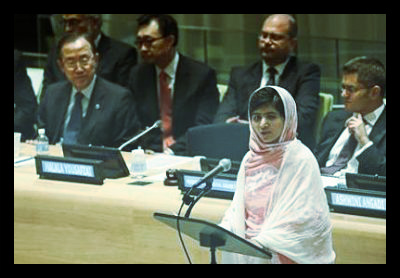Malala Yousafzai, Teenage Target of the Taliban

In October 2012, a Taliban militant walked onto a crowded bus of schoolgirls and demanded to know which of them was Malala Yousafzai. One of the girls pointed at the 14-year old Pakistani activist. Confident that he had properly identified his target, the gunman shot Malala in the head. A Taliban spokesman quickly claimed credit for the attack, telling Reuters news service that, “She was pro-west, she was speaking against Taliban and she was calling President Obama her ideal leader.”
But Malala Yousafzai was responsible for a much greater offense to Taliban ideology: she was a vocal critic of the Taliban’s prohibition of girls’ education in the Swat Valley region of Pakistan. Malala gained international acclaim in 2009 by penning an anonymous diary of a Pakistani schoolgirl, which was published as a blog on the BBC’s website. During that time, the Pakistani army had moved into the Swat Valley to remove the Taliban insurgency and Malala’s writing provided a firsthand account of the conflict.
In her writing, Malala criticized the Taliban’s edict to ban girls’ education in the Swat Valley. During their assault on the region, the Taliban burned more than 180 schools. Fearing additional retaliation, administrators chose to close an additional 900 private schools. Malala was unable to attend school and eventually she and her family were forced to leave their home in the Swat Valley. Through it all, Malala continued writing.
After finishing her blog in March 2009, Malala was the subject of a documentary by the New York Times. Her story came to epitomize the situation for millions of young girls who have no means or access to primary school education. In countries where the Taliban operates, this crisis is aggravated by the organization’s relentless assault on women’s rights. Malala gave a voice to millions of girls too afraid to speak out or protest.
Sensing Malala’s growing popularity and frightened by the content of her message, the Taliban decided to silence the young activist by assassinating her. Fortunately, their attempt failed. After making a miraculous recovery from her injuries, Malala is once again taking her message to the world stage. In July, she addressed the United Nations General Assembly. In a confident and enlightened speech, Malala urged global powers to help ensure the right of education for every child, including the sons and daughters of the Taliban.
Malcom X said, “If you educate a man, you educate one person. If you educate a woman, you educate and liberate a whole nation.” With her eloquent talk of peace, education, equality and human rights, Malala Yousafzai may prove to be the Taliban’s greatest adversary.
– Daniel Bonasso
Sources: The Guardian, Reuters, New York Times
